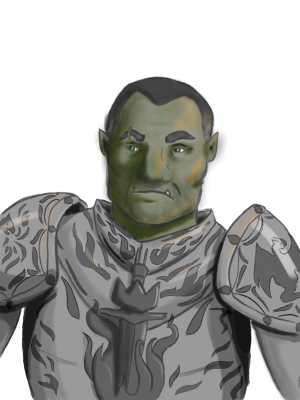Bartok Brescht
Bartok Brescht is the Captain-General of the Uman City Watch and the leader of House Brescht, one of the seven ruling families of Uman. He is a towering, imposing half-orc standing 6'6" with broad shoulders and a powerful, barrel-chested physique. His skin is a pale green, turning faintly grey at the extremities. His eyes, too, are green, piercing and intelligent. Bartok’s salt-and-pepper hair, worn in a short military cut, is the only evidence of his age; perhaps his early 60s. Bartok’s incisor tusks are small white points protruding just above his lower lip, more closely resembling inverted fangs than horn. His wide cheekbones, square jaw and prominent nose bridge combined with a relentless tenacity in pursuit of justice have gained him the nickname The Bull Terrier amongst the rank and file of the Watch, though never within his hearing.
Bartok was the 2nd-born son of Drakosh and his wife Umila Brescht. While his elder brother Belik was groomed to follow in Drakosh’s footsteps as Captain-General of the Watch, Bartok spent his adolescence as an acolyte of Bahamut, dividing his time between studies in the Umani Temple of Bahamut and on mission in the wild lands of Telisar. In his late 20s he married Aralir am Yvia, a half-elf he met on mission; the two settled in Zikrin’s Eyes, a town in Eastriver. Little is known of Bartok’s life during this period.
On the morning of his 41st birthday, word reached Bartok that Drakosh and Belik had both been killed while defending Uman from an attack; the Watch was in disarray and House Brescht left leaderless in the city, his mother Umila having died several years prior. Bartok and Aralir returned to Uman with their infant son. Bartok, now a paladin of Woden and bearing a formidable enchanted maul as a symbol of his office, declared himself Captain-General of the Watch, and in less than a year had brought the unruly organization to heel, while Aralir proved to be a fearsome leader of the Brescht family’s interests.
Brescht’s unwavering, rigid view of justice quickly brought him to odds with Uman’s other noble houses, notably the Simbali and the Pashtum, who for years had enjoyed unchecked profiteering at the expense of Uman’s most vulnerable citizens. Brescht stamped down on activities he declared unjust, and over the next two decades the city and its Watch Captain-General learned to tolerate one another. Brescht’s domineering influence brought a measure of peace to Uman, though tensions with the noble Houses has never lessened.
Bartok is inflexible and dogmatic, distrusting of politics and does not suffer fools. His unwavering confidence in his own opinion of what is right has more than once escalated conflicts within the city as the Watch has come into direct opposition with both its ruling Houses and its underworld elements. Despite this, Bartok’s reputation is of a man not to be crossed, and the sheer force of his will has kept Uman more-or-less at peace for over 20 years.
